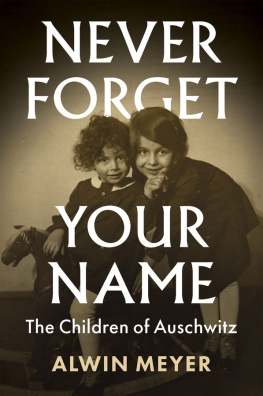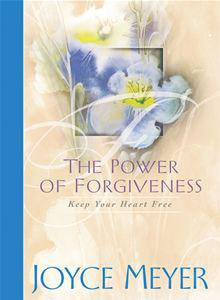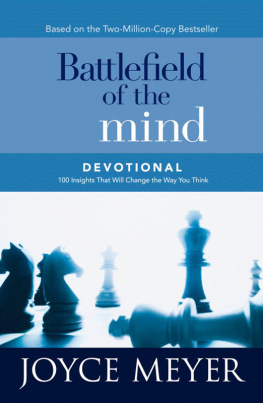Alwin Meyer - Never Forget Your Name
Here you can read online Alwin Meyer - Never Forget Your Name full text of the book (entire story) in english for free. Download pdf and epub, get meaning, cover and reviews about this ebook. year: 2022, publisher: Wiley, genre: Home and family. Description of the work, (preface) as well as reviews are available. Best literature library LitArk.com created for fans of good reading and offers a wide selection of genres:
Romance novel
Science fiction
Adventure
Detective
Science
History
Home and family
Prose
Art
Politics
Computer
Non-fiction
Religion
Business
Children
Humor
Choose a favorite category and find really read worthwhile books. Enjoy immersion in the world of imagination, feel the emotions of the characters or learn something new for yourself, make an fascinating discovery.
- Book:Never Forget Your Name
- Author:
- Publisher:Wiley
- Genre:
- Year:2022
- Rating:4 / 5
- Favourites:Add to favourites
- Your mark:
- 80
- 1
- 2
- 3
- 4
- 5
Never Forget Your Name: summary, description and annotation
We offer to read an annotation, description, summary or preface (depends on what the author of the book "Never Forget Your Name" wrote himself). If you haven't found the necessary information about the book — write in the comments, we will try to find it.
Never Forget Your Name — read online for free the complete book (whole text) full work
Below is the text of the book, divided by pages. System saving the place of the last page read, allows you to conveniently read the book "Never Forget Your Name" online for free, without having to search again every time where you left off. Put a bookmark, and you can go to the page where you finished reading at any time.
Font size:
Interval:
Bookmark:
Alwin Meyer
Translated by Nick Somers
polity
Originally published in German as Vergiss deinen Namen nicht. Die Kinder von Auschwitz by Alwin Meyer
Steidl Verlag, Gttingen 2015
This English edition Polity Press, 2022
The translation of this work was funded by Geisteswissenschaften International Translation Funding for Work in the Humanities and Social Sciences from Germany, a joint initiative of the Fritz Thyssen Foundation, the German Federal Foreign Office, the collecting society VG WORT and the Brsenverein des Deutschen Buchhandels (German Publishers & Booksellers Association).
The publishers gratefully acknowledge Catriona Corkes contribution to the English translation.
Polity Press
65 Bridge Street
Cambridge CB2 1UR, UK
Polity Press
101 Station Landing
Suite 300
Medford, MA 02155, USA
All rights reserved. Except for the quotation of short passages for the purpose of criticism and review, no part of this publication may be reproduced, stored in a retrieval system or transmitted, in any form or by any means, electronic, mechanical, photocopying, recording or otherwise, without the prior permission of the publisher.
ISBN-13: 978-1-5095-4550-6
A catalogue record for this book is available from the British Library.
Library of Congress Control Number: 2021941498
by Fakenham Prepress Solutions, Fakenham, Norfolk NR21 8NL
The publisher has used its best endeavours to ensure that the URLs for external websites referred to in this book are correct and active at the time of going to press. However, the publisher has no responsibility for the websites and can make no guarantee that a site will remain live or that the content is or will remain appropriate.
Every effort has been made to trace all copyright holders, but if any have been overlooked the publisher will be pleased to include any necessary credits in any subsequent reprint or edition.
For further information on Polity, visit our website: politybooks.com
This book is dedicated to Janek (Jack) Mandelbaum, without whose generosity the English translation would not have been possible. Having survived five Nazi concentration camps and the murder of his parents, sister and brother during the Holocaust, he has spent the last seventy-five years educating people about this dark period of history. His contribution to the publication of this book is part of that noble effort.
Children in Auschwitz: the darkest spot on an ocean of suffering, criminality and death with a thousand faces humiliation; contempt; harassment; persecution; fanatical racism; transports; lice; rats; diseases; epidemics; beatings; Mengele; experiments; smoking crematorium chimneys; abominable stench; starvation; selections; brutal separation from mothers, fathers, sisters, brothers, grandmothers, grandfathers, aunts, uncles and friends; gas
In 1940, a first camp by the name of Auschwitz, later to be known as the Main Camp or Auschwitz I, was erected by the Nazis on the outskirts of the Polish town of Owicim (65 kilometres west of Krakw). The first transport of Polish inmates arrived from German-occupied Poland in mid-1940. In 1941, the Nazis planned and built the killing centre (extermination camp) Auschwitz-Birkenau, also known as Auschwitz II, on the site of the destroyed village of Brzezinka.
From March 1942, Jewish children and their families were transported to Auschwitz from almost all German-occupied countries, for the sole reason that they were Jews. There were already a large number of Jewish boys and girls in the first transports to Auschwitz from Slovakia. Well over 200,000 children were to follow, and almost all of them were murdered.
The Auschwitz complex consisted of forty-eight concentration and extermination camps. Auschwitz-Birkenau has become the unmatched symbol of contempt for humanity, and a unique synonym for the mass murder of European Jewry. It was the site of the largest killing centre conceived, built and operated by the Germans, and played a central role in the Nazi Final Solution, the systematic extermination of Europes Jewish inhabitants.
By far the largest group of children deported to Auschwitz were thus Jewish girls and boys (see also ). Most of them were transported with their families in packed, closed and sealed freight cars, mercilessly exposed to the summer heat and freezing winters. They had to relieve themselves in buckets that were soon full. Because the wagons were so packed, many couldnt even reach the buckets in time and the floors were swimming in urine and excrement. The stench was overwhelming. In many cases, the deportees had little or nothing to eat or drink. Although especially the small children begged constantly for water, their entreaties went unheard. Many particularly infants, young children and elderly persons died during the journeys, which often lasted for days.
The Jews were deliberately kept in the dark about the real intentions of the Nazis. Before the deportations, they were told that they were being resettled in labour camps in the East, where they could start a new life.
The opposite was true. The Jewish children, women and men were destined to be murdered. They were welcomed at the ramp in Auschwitz with the bellowed order: Everyone out! Leave your luggage where it is! The few people who were initially kept alive never again saw the possessions they had been allowed to bring with them.
Selections began sporadically from April 1942, and then regularly from July of that year. They were carried out on the railway ramp, usually by SS doctors but also by pharmacists, medical orderlies and dentists. Young, healthy and strong women and men whom they considered fit for work were temporarily allowed to live and were separated from the old and invalid, pregnant women and children. Germans randomly classed around 80 per cent of the Jews often also entire transports as unfit for work, particularly during the deportations to the Auschwitz-Birkenau killing centre of 438,000 Hungarian Jewish children, women and men from May 1944. These people were marched under guard or transported in trucks by the SS to one of the crematoria, where they were ordered to undress. Under the pretext that they were to be showered, the SS herded them into the gas chambers disguised to look like showers. The poisonous gas Zyklon B was then introduced, and those inside suffered an agonizing death by suffocation. It took 10 to 20 minutes for them all to die.
Small children in Auschwitz were almost all killed on arrival. If a mother was carrying her child during the initial selection, they were both gassed, however healthy and fit for work the young mother might be. This was irrelevant. Pregnant woman also suffered a terrible fate in Auschwitz. They were automatically killed by phenolin injection, gassed or beaten to death. This applied initially to Jewish and non-Jewish women alike. Pregnant women from other concentration camps were also transferred to Auschwitz exclusively to be gassed.
A stay of execution was granted only to those condemned to heavy physical slave labour inside and outside the camp. These men and women were physically and psychologically exploited in road building, agriculture or industrial and armaments factories, in which inmates from the satellite camps in particular were forced into slave labour.
Sometimes children aged between 13 and 15 were also selected for work and allowed to live, usually only for a short time. For example, a large group of children and juveniles were assigned to the Rollwagen-Kommando, where they pulled heavy carts in place of horses, transporting blankets, wood or the ashes of incinerated children, women and men from the crematoria. They were highly mobile and had plenty of opportunity to see the atrocities taking place in the camp.
Font size:
Interval:
Bookmark:
Similar books «Never Forget Your Name»
Look at similar books to Never Forget Your Name. We have selected literature similar in name and meaning in the hope of providing readers with more options to find new, interesting, not yet read works.
Discussion, reviews of the book Never Forget Your Name and just readers' own opinions. Leave your comments, write what you think about the work, its meaning or the main characters. Specify what exactly you liked and what you didn't like, and why you think so.











